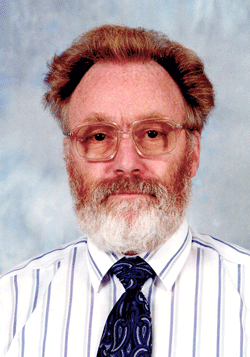A geochemist with first-rate intellect and extraordinary energy

Peter Floyd, born on 4 April 1937, was brought up and received his early education in Richmond, southwest London. He completed a Geology Honours degree at Leicester in 1959 and gained his PhD at Birmingham in 1962, for a thesis concerned with the Lands End Granite aureole in Cornwall.
Peter was then appointed to a lectureship at Keele University, where he remained for the rest of his professional life, rising to become Reader in Geochemistry. Peter became a geochemist at a time when analytical methods were changing radically. A few years after arriving at Keele he had established a fully-functioning geochemistry lab with automated X-ray Fluorescence spectrometry and the support of a dedicated and loyal team of technical staff.
Collaboration
While Peter’s initial research was on the geochemistry of magmatic rocks in southwest England, he subsequently undertook work based on rocks he had collected in Wales, Scotland, Ireland, Brittany, Germany, Poland and Turkey, and developed fruitful collaboration with geoscientists from the latter three countries. He also participated in the Deep Sea Drilling Project when it was sampling some of the oldest oceanic rocks then known from the floor of the western Pacific Ocean. After the fall of the Iron Curtain, Peter was an active participant in the TEMPUS scheme, helping to train staff and students from universities in southwest Poland in modern geochemical techniques and interpretation. At the same time he undertook collaborative research with Polish earth scientists in southern Poland.
Some years later, Peter was a key participant in the large EU-funded Palaeozoic Amalgamation of Central Europe (PACE) Transfer and Mobility of Researchers (TMR) project, coordinated from Keele and involving geoscientists from eleven European countries.
Peter’s work was published in over 160 scientific articles, many of which have attracted international interest and have been regularly quoted, including one that has achieved more than 5,000 citations. He also successfully supervised the research studies of 12 PhD students.
He was a Fellow of the Geological Society of London and a member of various other professional bodies. He was a co-founder of the USSHER Society, dedicated to the study of rocks in southwest England.
Retirement
In retirement, Peter also wrote a well-received book on The Building Stones and Stone Buildings of Staffordshire and became an active member of the North Staffordshire Group of the Geologists’ Association.
He and his wife Margaret were very hospitable, intrepid travellers and enthusiastic contributors to the local social scene, including events at Keele University, and the Reading Room in their home-village of Betley.
A man of total integrity, with a first-rate intellect and extraordinary energy, yet without vanity, uncomplicated, genuine and absolutely straight, who never disparaged others, Peter was an inspirational teacher and researcher. With high standards, and a wonderful sense of humour, Peter paid the same degree of meticulous attention to detail in his teaching, his fieldwork and his research.
Peter is survived by his wife Margaret, sons Richard and David, daughter Ruth and six grandchildren.
By John Winchester, with contributions from Gilbert Kelling